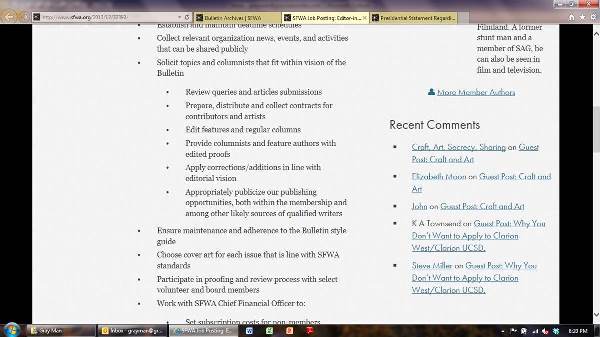Or, The Vicious, Small-Stakes Politics of the Science Fiction Community.
I’ve been watching yet another brouhaha in the Science Fiction and Fantasy Writers of America (SFWA). Or, to be precise, not really another one, more of a continuation of the one from last year involving the editorship of the SFWA Bulletin.
And as I skim over some of the posts that people have made about the matter, with one exception (dealt with below) it all reminds me of this quote:
Academic Politics Are So Vicious Because the Stakes Are So Small
My old boss had a very similar quote on her bulletin board, attributed to Henry Kissinger, but the idea was articulated in (political scientist Wallace Stanley) Sayre’s law, which states that “In any dispute the intensity of feeling is inversely proportional to the value of the issues at stake.” This “law” is appended with “That is why academic politics are so bitter.”
I venture to say that SFWA politics also involve relatively small stakes, and the vitriol expended on them is far out of proportion to the issues.
Which brings me for the moment to the exception I alluded to above, viz., the tendency to resort to ad hominem attacks instead of addressing the issues. It’s at least understandable in electoral politics, where scoring points may rally the base or shake up an opponent, and where the stakes are higher because the issues involve nontrivial impacts on people’s lives. Scoring points that way can even be amusing, if done with panache. But it’s usually unnecessary if one has a principled position to defend and a sound argument based on valid premises. Unfortunately, in these SFWA proceedings I detect much more inflammatory rhetoric than reasoned argument or entertainment. Perhaps I should not be too surprised: after all, writers are in the business of producing dramatic works. But unwarranted personal attacks raise my hackles, especially when directed at friends of mine; and I count as friends people all along the conservative-liberal spectrum, with whom I will stand when they are attacked even if I disagree with them on any particular matter under debate.
Which brings me back (in my convoluted way of thinking) to the actual matter under debate, specifically the infamous-within-SFWA-circles petition circulated after SFWA advertised for a new Bulletin editor, and the SFWA President’s assurance that the petitioners have nothing to fear. The president wrote that he saw “versions [of the petition] and they express concerns for something that does not and will not exist: Specifically, the editor of the Bulletin will not have to go to any selection or editorial review board to approve material.”
I submit that, even if true, that really doesn’t matter anymore.
The statement itself seems contrary to the Bulletin editor job advertisement — seen below in a screenshot taken yesterday — which reads that the editor will “Participate in [the] proofing and review process with select volunteer and board members.” But even if that enigmatic item does not refer to an editorial review board, it doesn’t matter because the idea of the Bulletin editor having much in the way of autonomy evaporated with the dismissal of the previous editor over the “warrior woman” cover and the Resnick-Malzberg historical article that violated an unwritten, unspoken taboo by noting a female editor’s attractiveness.

(Screenshot of the SFWA Bulletin editor job advertisement, taken February 17, 2014. Click to enlarge.)
Does anyone realistically believe that the new editor of the Bulletin will not be aware of that precedent, and that it will never prick the back of their mind like some mental sword of Damocles? Right there in the job description are references to a vague “vision” and unspecified “SFWA standards,” and many vociferous members no doubt stand ready to enforce the standards as they see fit. As the Operative in Serenity said, in a different context to be sure, “Damage done.”
So came the latest brouhaha: some members and nonmembers signed a petition expressing concern over the editorial board notion, which if formed would only institutionalize the weakened position of the editor. And their petition was met, as such things often are, not with thoughtful objections but with scorn, ridicule, and anger. None of which will make much difference in the long run, because the castle keep of editorial (and authorial) license was stormed last year and now lies in rubble.
All of this seems to me clear examples of the viciousness of organizational politics over stakes that are pretty trivial.









The more they fight over the mountain, the more of a molehill it becomes. An organization that drives out dissenters is a weaker organization when it comes time to negotiate with the publishers — especially if those it drives out are some of the bigger names.
Certainly the more people become dissatisfied and leave the less any organization can claim to represent the broader cohort. And as you noted, the smaller SFWA gets, the more marginal it will be.
Thanks,
G